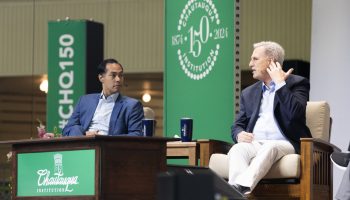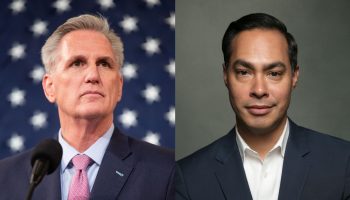MAX ZAMBRANO – STAFF WRITER
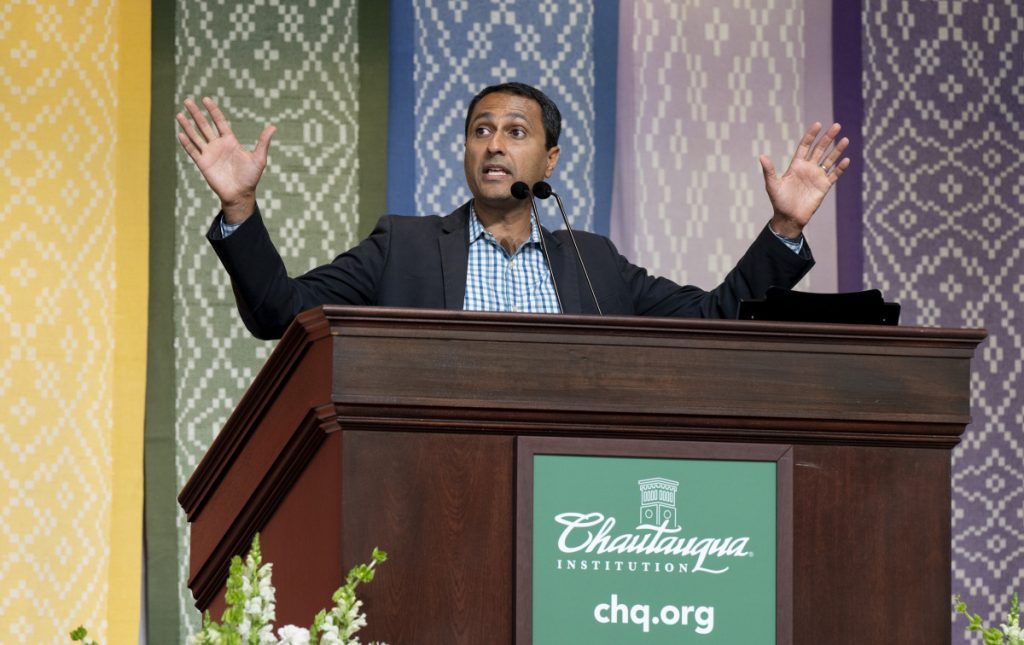
When the pilgrims arrived at Plymouth Rock in 1620, they were shocked to brush it off and see the words “Judeo-Christian nation” written on the stone.
Eboo Patel knew he couldn’t fool his Chautauquan audience with this fictional narrative, but he said they should see how 18-year-olds, even at prestigious universities, respond with some confusion to this story.
The idea of the United States being a Judeo-Christian nation, however, is a bit of a myth, Patel said.
“ ‘Judeo-Christian nation’ was invented about 90 years ago,” he said. “Somebody made it up.”
It was part of America’s unfolding, evolving story of religious diversity, he said. After nearly a century, Patel said it is time to create a new myth. Patel explored this notion at 1 p.m. in the Amphitheater on Monday, July 19 in his lecture titled “Interfaith America,” which he said is what people should call this next chapter for America’s religious story. It was the first of three Week Four Interfaith Lectures, themed “The Evolving Religious Narrative of America.”
Patel works in this field — he is the founder and president of the Interfaith Youth Core, a national nonprofit which cooperates with higher education and corporations to create the next set of leaders in a religiously diverse world, according to its website.
Just because this most recent chapter of America’s religious history was made up by men in the 1930s does not make it useless, Patel said. He is also not suggesting we cancel this chapter, but rather continue the story. But first, he explained why this chapter was written.
When New York Gov. Al Smith won the Democratic Party’s 1928 presidential nomination, he became the first Catholic of any major party to win the nomination. At this time, Patel said there were millions involved in the Ku Klux Klan and anti-Semitic groups.
“ ‘If he wins,’ they said, ‘he will send a one-word telegram to the Pope: ‘Unpack,’ ” Patel said, saying that people feared a Catholic president would allow the Pope to run the country. These efforts consequently led to Smith’s loss to Herbert Hoover that year, and groups like the National Conference on Christians and Jews — now the National Conference on Community and Justice — felt they needed to change this narrative.
They put on activities aimed at uniting religions, such as trialogues between rabbis, priests and pastors, Patel said. Despite increased efforts through the next several years, the next president, Franklin Roosevelt, said America was a Protestant nation. Those trying to change this narrative came to a realization.
“They recognized, frankly, that no amount of civil activity, no matter how important, would shift the image of the nation the way new language can,” he said.
So, the myth of the United States being a Judeo-Christian nation was created, Patel said.
“They wrote a myth at a hinge point in American history,” he said. “We’re at another hinge point. We have the chance to be authors of something remarkable — of the next chapter.”
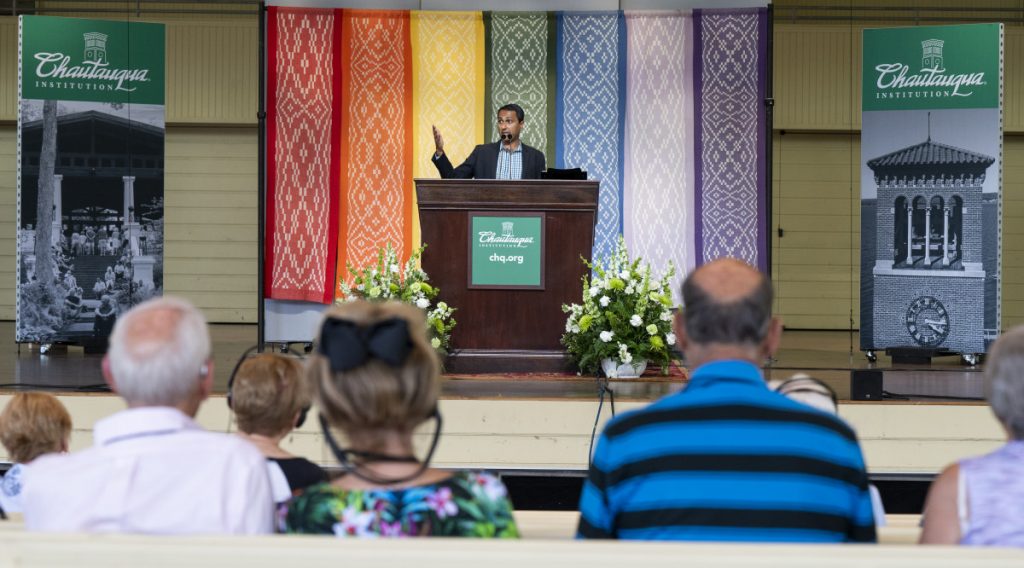
Patel finds this new chapter particularly important because as issues surrounding diversity stay at the forefront of conversation, he said he notices a lack of conversation surrounding religious diversity. To explain, he referenced colleges’ first-year student orientations.
“Those three or four days, the college tells incoming students, ‘This is who we are,’ ” Patel said. “Wherever I might be, I ask how much of the time is given to diversity issues. Provosts, presidents, deans of students and sophomores will proudly tell me 50-60%.”
Of the approximately two days worth of time devoted to diversity, Patel then asks how much is devoted to religious diversity.
“Everybody gets real quiet,” he said. “So tell me, does it not matter that we live in the most religiously diverse nation in human history? In the most religiously devout country in the Western Hemisphere?”
Patel believes it is worth pursuing an interfaith America. David French, who spoke in Tuesday’s Chautauqua Lecture Series, notes that the 13 colonies were combatants in the European wars of religion, Patel said, yet they agreed to build a nation together. Patel extended this idea saying that the country’s founders recognized a danger with factions and sects, but it could work under pluralism.
“(They said) if we allow everyone in and (give them) an equal place at the table with religion, they will work it out and build it together,” Patel said.
Fair dealings across religions was seen well before the United States became a country, Patel said, referencing Roger Williams, who he said mutually engaged with Narragansett Indians, where both parties learned from one another. Williams ultimately founded Providence Plantations on the basis of broader religious freedom — this land is now the state of Rhode Island.
“All of this is to say that, as T.S. Eliot remarked, ‘We Americans inherit something remarkable when it comes to articulations of what religious pluralism could be. What are we doing that makes ourselves worthy of that inheritance?’ ” Patel said.
This led Patel to his next point, the civic contributions of religious communities. He asked everyone to imagine themselves in the center of their city, and to imagine that every institution founded by a religious community disappeared overnight.
Of course, he said, places of worship would disappear.
“What else happens when houses of worship go away?” he asked. “Where do AA meetings meet? Who fills the backpacks of the kids who get free school lunch during the week and are wondering where their weekend meals are going to come from? What runs the Thanksgiving turkey drives? Who runs the tutoring programs?”
In addition, Patel said numerous hospitals and colleges would disappear; think Loyola University Medical Center, Northwestern Memorial Hospital (where Patel’s wife went to school and where his children were born, respectively), Duke University, Emory University, Notre Dame University, Georgetown University — and Chautauqua Institution.
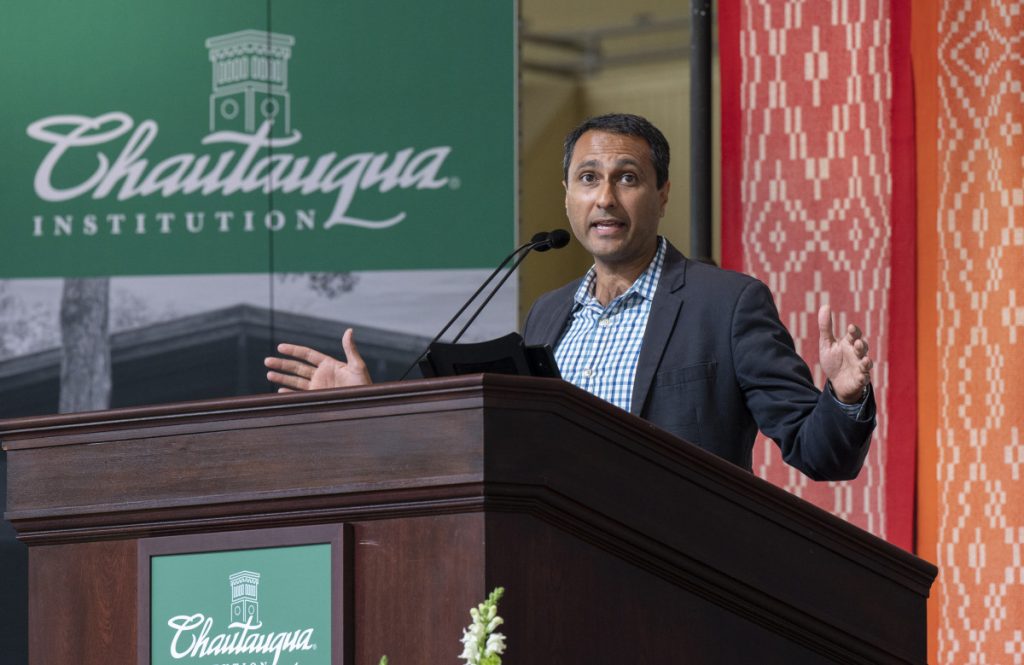
Without these civic contributions from religious communities, Patel said democracy cannot exist.
“In a democracy, no president, no general, no mayor says that you have to gather, that you have to have a Chautauqua, that you have to come together in a potluck, that you have to build a private hospital or school that serves everybody,” he said. “The people build those things.”
Interfaith America already exists, Patel said, as the country already has an equal number — 4 million — of evangelical Lutherans, Muslims and Buddhists. The average age of evangelical Lutherans in America is in the 50s, while Muslims and Buddhists average in their 30s, Patel said.
Furthermore, Patel said the most religiously diverse demographic in the U.S. is 18-29 years old.
“You are just as likely in some parts of the country to run into an Ali as an Al,” he said.
To gauge what the country will look like in the next several decades, Patel said to look at the demographics in one’s local preschool, close to areas where refugees have resettled.
“That’s what America looks like now, and what the rotary club will look like in 30-40 years,” he said. “Those will be civic, business and political leaders.”
Although it’s time for a new chapter in America’s religious history, Patel acknowledged the Judeo-Christian narrative worked.
“Do you remember the dozens of articles that sounded the alarm about Joe Biden’s Catholicism and (that) he would be in cahoots with the Pope to run the country?” he asked as the Amp responded with silence. “That’s because they didn’t exist.”
Patel then noted that people looked at him differently for being named Eboo instead of Ed during high school, 23 years ago, but he said it shouldn’t be this way.
“That’s why frames matter so much,” he said. “That’s why myths matter so much. They write people into the story. They say to the teacher who couldn’t get my name right that the problem is not my name — I have an American name — it’s your pronunciation. You should’ve prepared for me.”
Changing the story not only impacts the present, but also how people perceive the past, Patel said. The enslaved people shipped from West Africa to North America were likely whispering the Shahada, or profession of faith in Islam, on their ships, he said. Moreover, the Blue Note, commonly used in jazz music, is believed to come from those who listened to enslaved people chant the Adaan, or Muslim call to prayer.
Patel said this widens the story of America’s religious history, realizing where aspects of culture derive.
Lastly, Patel said it was simply important to give a name to something even if it already exists.
He described a scenario where friends gather, one with a wooden stick and the other with a white ball, and each day they would meet with other friends and conjure up rules about hitting the ball, what happened if it was caught, and so on. Instead of explaining the rules each day, the hypothetical group should just call it baseball, wrapping all the rules into one word.
“It makes it cohesive,” Patel said. “It makes it whole.”
Calling this next chapter of America’s religious history “Interfaith America” takes what the country is and makes it whole and cohesive, he said.
“Our ancestors wrote a myth that served us well over a century,” he said. “It’s time for us to write another that will serve generations of the future.”


